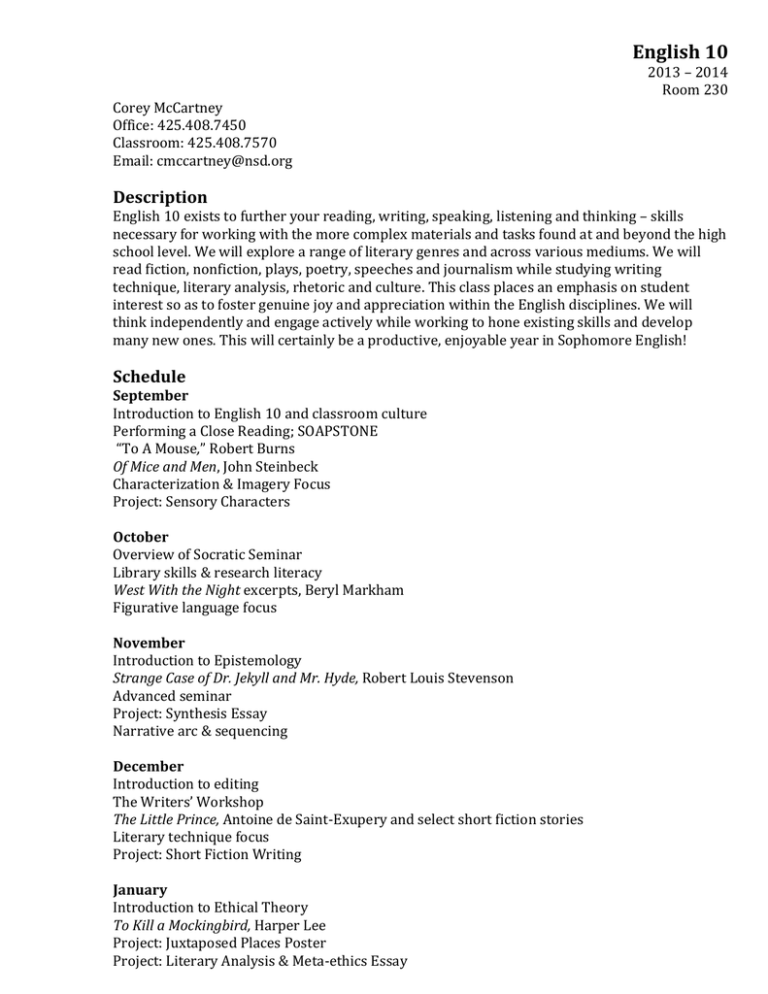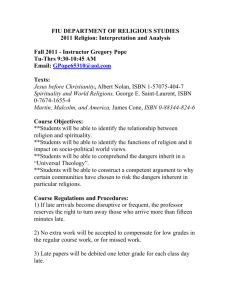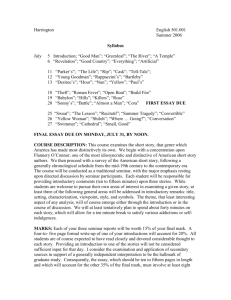English 10
advertisement

English 10 Corey McCartney Office: 425.408.7450 Classroom: 425.408.7570 Email: cmccartney@nsd.org 2013 – 2014 Room 230 Description English 10 exists to further your reading, writing, speaking, listening and thinking – skills necessary for working with the more complex materials and tasks found at and beyond the high school level. We will explore a range of literary genres and across various mediums. We will read fiction, nonfiction, plays, poetry, speeches and journalism while studying writing technique, literary analysis, rhetoric and culture. This class places an emphasis on student interest so as to foster genuine joy and appreciation within the English disciplines. We will think independently and engage actively while working to hone existing skills and develop many new ones. This will certainly be a productive, enjoyable year in Sophomore English! Schedule September Introduction to English 10 and classroom culture Performing a Close Reading; SOAPSTONE “To A Mouse,” Robert Burns Of Mice and Men, John Steinbeck Characterization & Imagery Focus Project: Sensory Characters October Overview of Socratic Seminar Library skills & research literacy West With the Night excerpts, Beryl Markham Figurative language focus November Introduction to Epistemology Strange Case of Dr. Jekyll and Mr. Hyde, Robert Louis Stevenson Advanced seminar Project: Synthesis Essay Narrative arc & sequencing December Introduction to editing The Writers’ Workshop The Little Prince, Antoine de Saint-Exupery and select short fiction stories Literary technique focus Project: Short Fiction Writing January Introduction to Ethical Theory To Kill a Mockingbird, Harper Lee Project: Juxtaposed Places Poster Project: Literary Analysis & Meta-ethics Essay February Introduction to rhetorical analysis and symbolic logic Julius Caesar, William Shakespeare Introduction to speech and debate Research literacy focus (student choice) Project: Oxford Format debate March HSPE Preparation: Expository Essay, Persuasive Essay, and Reading Comprehension The House on Mango Street, Sandra Cisneros Project: poetry writing & reading April Introduction to film analysis: concepts & terminology Film analysis study Project: Film Analytical Essay May Introduction to Memoir: Excerpts This Boy’s Life, Tobias Wolff Narrative Composition focus June Project: Memoir Writing Personal reflection Necessary Materials Dedicated English Composition Notebook Pen, pencil, highlighter, sticky notes Personal book copies encouraged but not required Dedicated English Organizer/Folder Planner/Calendar Technology in the Classroom Turnitin.com Significant coursework will be submitted electronically. Please enroll: Website: http://www.turnitin.com Course ID Period 2: 6913903 | Period 3: 691392 | Period 4: 6913930 | Password: English10 Period 6: 6913951 Course Webpage Assignments, due dates and a contact form can be found electronically on the course website: www.nsd.org/cmccartney (also searchable through WHS homepage). Personal Electronics Phones, tablets, audio players, etc. may be utilized as classroom resources, but only at appropriate times and for appropriate purposes. It is a class objective that all students develop excellent judgment of this appropriateness. Repeated poor judgment will quickly result in the loss of this resource. When not instructed to do so, please ask permission before using any personal electronic in class. Assessment & Policies The grade you earn in this class is an indicator, designed to reflect your achievement in reaching objectives that will be clearly specified. Earning a high grade in this class should not be the object of your focus while participating in class. That would be like gazing off at the prize on display while attempting to hit the bullseye in an archery competition. You’d miss the target. Instead, I hope you come to view the task at hand as most deserving of your full attention. Your involved participation, pride in work, open mindedness, and willingness to grow intellectually will create success in this class. The following percentages are approximations: Classwork (e.g. freewrite, note taking, in-class essay): 20% Homework (e.g. socratic seminar prep. questions, research, text annotation: 20% Test & Quiz (e.g. reading puppy): 20% Performance (e.g. essay, socratic seminar, project, debate): 40% Deadlines If you fail to meet a deadline on an assignment, then it likely means one of a couple different scenarios. (1) If you have been absent, then you will be given the number of days absent as the number of days to make up all missed work for full credit. One exception to this is for in-class participation, which occurs in class only (e.g. seminar, debate, puppy). An absence during an inclass participation assignment will result in an alternate assignment will be assigned. (2) If you have not been absent, then 10% will be subtracted from the grade of the late assignment for each class day that it is late. No assignment will lose more than 50%, no matter how late it is submitted. Plagiarism Plagiarism is the act of taking another’s work or idea and submitting it as one’s own. Plagiarism is a serious offense and will result in receiving no credit for that assignment and contact with home. Collaboration and plagiarism are different things. If you are ever unsure of what constitutes plagiarism, just ask. Grading Scales A AB+ B BC+ C CD+ D F + 100% 100–93% 92–90 89–87 86–83 82–80 79–77 76–73 72–70 69–67 66–60 59–0 + 90 75 50 0 4.0-3.8 3.7-3.4 3.3-3.1 3.0-2.8 2.7-2.4 2.3-2.1 2.0-1.8 1.7-1.4 1.3-1.1 1.0+ A A- B+ B B- C+ C C- D+ D (based on collegeboard.com) Attendance & Tardiness Arriving less than 10 minutes late is marked as tardy. Arriving more than 10 minutes late is marked as absent. Unexcused absences will receive a phone call home from the WHS attendance desk. Attendance errors are resolved by the student collecting the appropriate form at the attendance desk, getting the teacher’s signature, and returning it to the attendance desk. Regarding school attendance policies, see WHS Handbook. Classroom Principles The most vibrant classroom culture is one in which each student takes full responsibility for him or her self through constant awareness and self-monitoring, with occasional helpful feedback from peers and teacher on this. Some essential rules will be established at the beginning of our class, and additional rules will be dispensed and enforced as is necessary to fully protect the emotional, intellectual, and physical well being of all class members. Rules are limitations, and progress will be hindered by having too many of them in our class. It is a shared goal of all class members, then, to always act responsibly, respectfully, and keep additional rules unnecessary. This is a classroom of shared inquiry -- a safe environment for reading, writing, speaking, listening and exploring. I thank you for being a member of our class. I am excited to build a fun and rewarding classroom community together as we share many good times in English 10! Warm regards, Corey McCartney -----------------------------------------------------------------------------------------------------------Student Signature: _______________________________________________________________________ Date ___________________ Parent/Guardian Signature: ________________________________________________________________________ Date __________________




